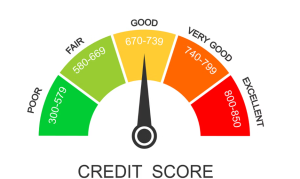Decoding the Credit Score Enigma: Unveiling the True Meaning
3 min read
Your credit score, that three-digit numerical representation, wields considerable influence over your financial life. But what does it really mean beyond the surface? This article aims to unravel the intricacies of the credit score, exploring its significance, the factors that shape it, and the real-world implications it holds for your financial health.
The Numerical Essence: At its core, a credit score is a numerical reflection of your creditworthiness. Ranging from 300 to 850 in the commonly used FICO score, the higher the number, the better your credit standing. Understanding the numerical scale is the first step in comprehending the significance of your credit score.
Credit Score Components: A credit score is not a random number; it is meticulously calculated based on several factors. The primary components include payment history, credit utilization, length of credit history, types of credit in use, and new credit. Each of these elements plays a distinct role in shaping your credit score.
Payment History: The most influential factor in your credit score is your payment history. Timely payments on credit accounts, loans, and bills contribute positively, showcasing responsible financial behavior. Conversely, late payments, defaults, and bankruptcies have adverse effects on your credit score.
Credit Utilization: Credit utilization refers to the ratio of your credit card balances to your credit limits. Keeping this ratio low—typically below 30%—positively impacts your credit score. High credit card balances relative to your credit limits can signal financial strain and negatively affect your score.
Length of Credit History: The length of your credit history is another crucial factor. A longer credit history generally contributes positively to your score, demonstrating a track record of responsible credit management. This is why closing old credit accounts may impact your credit score, as it shortens your overall credit history.
Types of Credit in Use: Credit scoring models consider the variety of credit accounts you have, including credit cards, installment loans, and mortgages. A diverse mix of credit can positively impact your score, showcasing your ability to manage different types of credit responsibly.
New Credit: Opening multiple new credit accounts within a short period can be perceived as a risk by credit scoring models. Each new credit inquiry generates a small, temporary dip in your credit score. Therefore, it’s advisable to be cautious about applying for multiple new credit accounts within a short timeframe.
Real-World Implications: Your credit score extends beyond being a mere number; it holds real-world implications. A high credit score opens doors to favorable interest rates on loans and credit cards. It can result in lower insurance premiums and even impact your ability to secure rental housing or employment in some cases.
Credit Score Tiers: Credit scores are often categorized into tiers, indicating different levels of creditworthiness. While specific cutoffs may vary, the general breakdown includes poor, fair, good, very good, and excellent. Knowing where your score falls within these tiers provides insight into how lenders may perceive your creditworthiness.
Continuous Monitoring and Improvement: A credit score is not static; it evolves based on your financial actions. Regularly monitoring your credit report, addressing inaccuracies promptly, and adopting responsible financial habits contribute to ongoing credit score improvement.
Conclusion:
Your credit score is a multifaceted indicator that encapsulates your financial history, habits, and potential future behavior. Beyond the numerical representation, it serves as a gatekeeper to financial opportunities and can significantly impact various aspects of your life. Understanding the components that shape your credit score empowers you to make informed financial decisions and actively contribute to the ongoing improvement of your creditworthiness.





